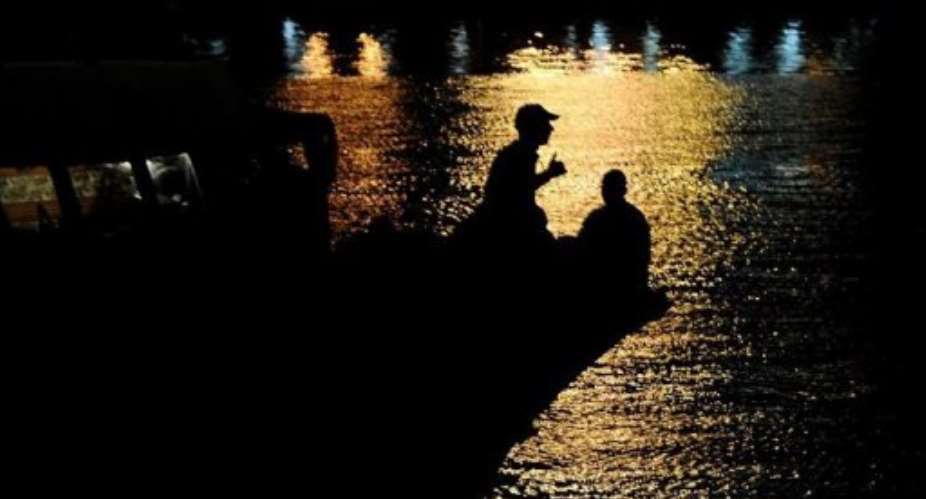ZARZIS, Tunisia (AFP) - Eritrean Abbes Settou, the sole survivor among some 50 migrants who died of hunger and thirst after their inflatable boat ruptured in the Mediterranean, said Wednesday he had survived "by the grace of God."
Speaking to AFP from hospital in Tunisia, Settou, said his fellow passengers, who included other Eritreans and a group of Somalis, "died of hunger, of thirst, of exhaustion. We threw their bodies overboard."
Among the dead, he said were 10 women.
Earlier, the UNHCR in Geneva said Settou, who drank sea water to survive, was spotted clinging to a jerry can and the remains of the boat off the Tunisian coast on Monday night by fishermen who alerted the coast guard.
Settou said there was no fresh water on board and people started to perish within days, including three members of his family, according to the UNHCR.
The refugee agency quoted him as saying 55 people boarded the boat in the Libyan capital Tripoli in late June, and that more than half were from Eritrea, including himself.
They were unable to call for help because the boat's satellite phone was broken, according to Father Mussie Zerai, an Eritrean priest who spoke to the survivor by telephone on Wednesday.
"He said they were at sea for 15 days in total," the priest told AFP.
"They had apparently reached Italian waters but they weren't able to call for help because the satellite phone was broken, so the wind pushed them back out into open sea.
"During those 15 days the people on board slowly began dying of hunger and thirst. They were lost, they could not orient themselves.
"He is recovering. In a few days he said he would be moving to a refugee camp."
A UNHCR official in Tunisia said Settou would be moved to an apartment in Zarzis, which is 400 kilometres (240 miles) southeast of Tunis, near the Libyan border.
In his account of the ordeal to the UN High Commissioner for Refugees, Settou said the boat had punctured and air started to leak out.
UNHCR spokeswoman Sybella Wilkes said Settou is "in a pretty awful state and he's obviously gone through a terrible, terrible experience progressively watching his family members dying."
"This is a tragedy," said T. Alexander Aleinikoff, Deputy High Commissioner for Refugees. "I call upon all vessels at sea to be on heightened alert for migrants and refugees needing rescue in the Mediterranean."
The UN agency estimates that 170 people have been declared dead or lost at sea attempting to make the journey from Libya to Europe so far this year.
Greece and Italy are the two main entry points for undocumented immigrants into the European Union. Italy in particular has seen a spike in arrivals over the past year following the Arab Spring revolts in North Africa.
Malta is also a frequent landing point but is increasingly being spurned by immigrants worried about the relatively lengthy registration process for new arrivals, the UNHCR said.
"With that knowledge, people are going on to Italy," said Wilkes.
"We didn't see this at all last year, that boats are finding their way to Malta and then refusing to go in."
So far in 2012, more than 1,300 people have made the sea journey to Italy from Libya, the UNHCR said. The busiest period for crossings is from May to September, when the Mediterranean Sea is at its calmest, the agency added.





 Akufo-Addo’s govt is the ‘biggest political scam’ in Ghana’s history – Mahama ja...
Akufo-Addo’s govt is the ‘biggest political scam’ in Ghana’s history – Mahama ja...
 Performance Tracker is not evidence-based — Mahama
Performance Tracker is not evidence-based — Mahama
 Four arrested for allegedly stealing EC laptops caged
Four arrested for allegedly stealing EC laptops caged
 $360 million IMF bailout not enough for Ghana – UGBS Professor
$360 million IMF bailout not enough for Ghana – UGBS Professor
 Shrinking Penis Allegations: Victim referred to trauma hospital due to severity ...
Shrinking Penis Allegations: Victim referred to trauma hospital due to severity ...
 Adu Boahen Murder: Case adjourned to May 9
Adu Boahen Murder: Case adjourned to May 9
 ‘I've health issues so I want to leave quietly and endure my pain’ — Joe Wise ex...
‘I've health issues so I want to leave quietly and endure my pain’ — Joe Wise ex...
 Let’s help seek second independence for Ghana before NPP sells the country – Law...
Let’s help seek second independence for Ghana before NPP sells the country – Law...
 New Force aims to redeem Ghana and West Africa — Nana Kwame Bediako
New Force aims to redeem Ghana and West Africa — Nana Kwame Bediako
 ‘I didn't say I would buy Ghana if voted against; I said I’ll buy it back from f...
‘I didn't say I would buy Ghana if voted against; I said I’ll buy it back from f...
